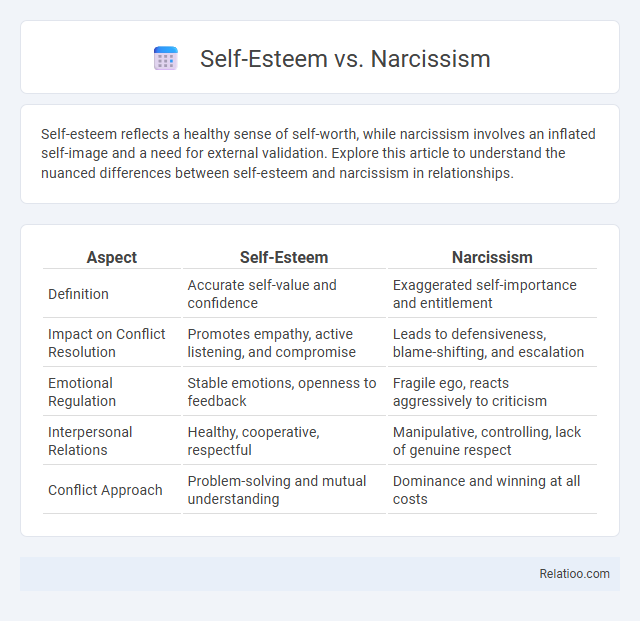Self-esteem reflects a healthy sense of self-worth, while narcissism involves an inflated self-image and a need for external validation. Explore this article to understand the nuanced differences between self-esteem and narcissism in relationships.
Table of Comparison
| Aspect | Self-Esteem | Narcissism |
|---|---|---|
| Definition | Accurate self-value and confidence | Exaggerated self-importance and entitlement |
| Impact on Conflict Resolution | Promotes empathy, active listening, and compromise | Leads to defensiveness, blame-shifting, and escalation |
| Emotional Regulation | Stable emotions, openness to feedback | Fragile ego, reacts aggressively to criticism |
| Interpersonal Relations | Healthy, cooperative, respectful | Manipulative, controlling, lack of genuine respect |
| Conflict Approach | Problem-solving and mutual understanding | Dominance and winning at all costs |
Understanding Self-Esteem: A Core Psychological Need
Understanding self-esteem is crucial because it serves as a core psychological need that influences emotional well-being and social functioning. Unlike narcissism, which is characterized by an inflated sense of self-importance and a lack of genuine self-worth, healthy self-esteem reflects realistic self-appraisal and acceptance. Your ability to cultivate authentic self-esteem fosters resilience and meaningful relationships, distinguishing it from the superficial confidence found in narcissistic traits.
Defining Narcissism: Beyond Confidence
Narcissism extends beyond healthy self-confidence by involving an inflated sense of superiority coupled with a deep need for admiration and a lack of empathy for others. While self-esteem reflects a balanced and realistic appreciation of your own worth, narcissism often masks underlying insecurities and involves manipulative or exploitative behaviors. Understanding the distinctions can help you recognize genuine self-assurance versus harmful narcissistic traits in yourself and others.
Key Differences Between Self-Esteem and Narcissism
Self-esteem represents a realistic and appreciative self-view grounded in genuine self-worth, while narcissism involves an inflated, often fragile ego with a need for external validation. Key differences include self-esteem's foundation on self-acceptance and empathy versus narcissism's emphasis on superiority and lack of empathy toward others. Understanding these distinctions highlights how healthy self-esteem supports balanced relationships, whereas narcissism often leads to conflict and emotional instability.
Healthy Self-Esteem vs. Inflated Ego
Healthy self-esteem reflects a balanced and realistic sense of self-worth, allowing you to acknowledge your strengths and accept your limitations without self-deception. In contrast, an inflated ego, often linked to narcissism, involves an exaggerated sense of superiority and a constant need for validation, which can damage relationships and hinder personal growth. Cultivating healthy self-esteem promotes emotional resilience and genuine confidence, while an inflated ego fosters insecurity masked by arrogance.
Signs of Genuine Self-Esteem
Genuine self-esteem is characterized by an accurate self-awareness, humility, and the ability to accept both strengths and weaknesses without defensiveness. Signs include consistent confidence without arrogance, empathy towards others, and resilience in the face of criticism. Unlike narcissism, which involves grandiosity and a constant need for validation, genuine self-esteem fosters healthy relationships and emotional stability.
Red Flags of Narcissistic Behavior
Narcissistic behavior is often marked by red flags such as an excessive need for admiration, lack of empathy, and a heightened sense of entitlement. Unlike healthy self-esteem, which reflects a balanced and realistic self-view, narcissism distorts self-perception and fosters manipulative or exploitative tendencies. Recognizing these signs is crucial to differentiate between genuine confidence and harmful narcissistic traits.
Impact on Relationships: Self-Esteem vs. Narcissism
Healthy self-esteem fosters genuine connections by promoting empathy, trust, and effective communication in relationships. Narcissism, characterized by excessive self-focus and lack of empathy, often leads to manipulation and conflicts that damage relational bonds. Understanding the difference can help you cultivate balanced self-worth that strengthens your personal connections.
Origins: How Self-Esteem and Narcissism Develop
Self-esteem originates from genuine self-worth built through positive experiences and supportive relationships, fostering authentic confidence. Narcissism develops from deep-seated insecurities, often rooted in early childhood trauma or neglect, resulting in an inflated but fragile self-image. Understanding these origins helps you differentiate between healthy self-esteem and narcissistic traits, promoting better emotional awareness.
Strategies to Build Healthy Self-Esteem
Developing healthy self-esteem involves recognizing your intrinsic worth without descending into narcissistic tendencies that inflate ego unrealistically. Strategies such as practicing self-compassion, setting realistic goals, and seeking constructive feedback help strengthen your confidence while maintaining humility. Emphasize authentic self-awareness and emotional regulation to foster a balanced self-view distinct from narcissism.
Overcoming Narcissistic Tendencies for Personal Growth
Overcoming narcissistic tendencies is essential for cultivating genuine self-esteem grounded in self-awareness and empathy. Your personal growth depends on recognizing the differences between healthy self-respect and harmful narcissism, which inflates ego while masking insecurities. Developing mindfulness and seeking constructive feedback can transform narcissistic traits into authentic confidence and emotional resilience.

Infographic: Self-esteem vs Narcissism
 relatioo.com
relatioo.com